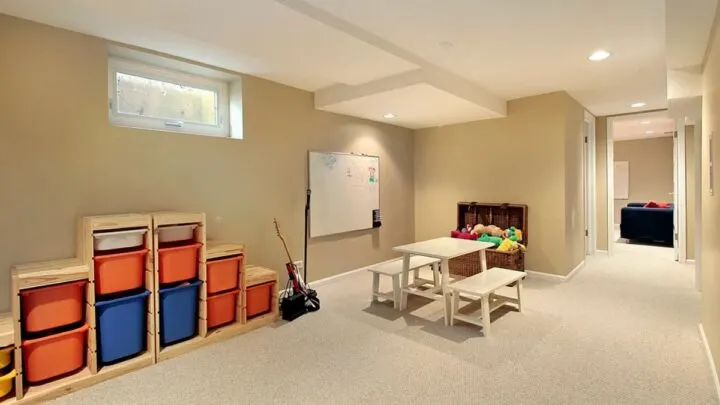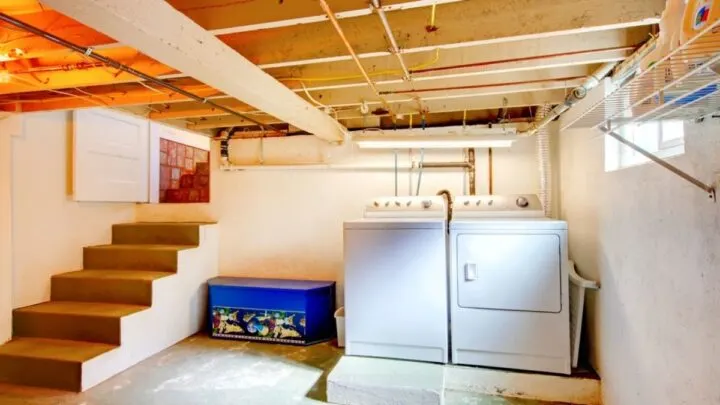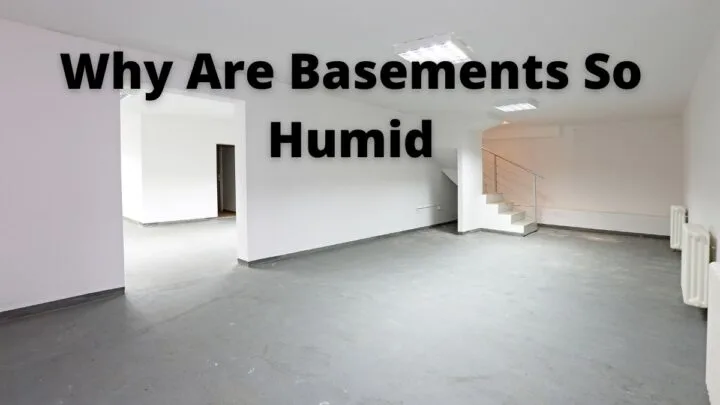Basements are infamous for being dark and damp, which is why they tend to retain more humidity.
Unfortunately for homeowners, a small amount of moisture can quickly turn into a major issue.
Common causes of basements being humid are inadequate ventilation and poor insulation. Basements also get wet or moist more often because they are built underground.
As a result, you should crack open those windows (if you have them in the basement) to allow fresh air to circulate, or get a dehumidifier. These both can reduce humidity and the risk of mold and mildew forming.
If you’re unsure what to do with your basement or how to cope with moisture, keep reading to learn how moisture enters this space and what you can do to prevent it.
Why Do Basements Get Humid?
To know how basements get humid, you must figure out where the water is coming from and what allows it to get into the basement. Moisture mostly comes from the following places.
Diffusion Of Vapor
The transport of moisture in the vapor state through a substance is known as vapor diffusion.
Humidity and moisture can migrate in the form of vapor through permeable base walls or floors and down into the basement’s dry areas.
The quantity of moisture that penetrates is determined by the penetrability of the concrete as well as the pressure of the vapor.
Structural Cracks
If your foundation has cracks, it’s likely that water will get through them and find its way to enter the basement through these gaps.
Soil settling and improperly linked floor joists can cause these structural cracks. This issue can be resolved by contacting a contractor to fix the foundation.
Capillary Suction
Capillary suction happens when wet or soaked spills encounter your basement’s concrete walls. Concrete holes that are small allow water to be pulled in.
As a result, you can see damp rings around the walls of your basement.

How To Prevent Your Basement From Getting Humid
Here are a few simple and quick ways to fix the humidity level in your basement.
Dehumidifiers
Dehumidifiers are incredible gadgets that employ silica gel beads to capture water vapor in your basement.
Water vapors can stay in the environment for days or weeks, despite the fact that the basement looks to be dry. You can measure the humidity levels with a hygrometer.
If the humidity level in your basement is above 60%, invest in a dehumidifier that drains itself.
It will absorb the vapors in the air and dry them out.
Drainage On The Inside
Summer does not necessarily have to be hot and dry always. There will be rain on occasion, which will enhance the humidity of the basements.
This can easily be prevented by installing an interior drainage system, such as BasementGutter, in order to reduce the chances of water seeping and accumulating into the basement.
Patch Up Any Cracks In The Foundation
Sealing the cracks in walls is a good idea to prevent basements from getting unnecessary moisture.
If you neglect this part, water vapors will seep through the cracks into your basement.
Opening or Closing Windows
The summer sun may make the air humid and hot.
Keeping the windows open while you are down there is an excellent method to get air circulating in the room.
It might worsen the situation too, though, depending on the humidity outside.If you must open the windows, early mornings or very late at night when the air is much cooler are the best times.
This is due to the fact that cold air has less moisture in it.
Be Careful With Watering Your Garden
When you water the garden with a sprinkler, water ends up in places where it shouldn’t be.
Some of it could make its way to the concrete foundation.
Also, once the soil becomes saturated with water, some of it will inevitably be pulled up through fissures as well.

Is A Humid Basement Harmful?
If moisture sets in your basement, it can cause a slew of issues if you don’t address it right away.
Here are some of the most common issues that can be caused by a humid basement.
- Mold is likely to be the most common issue. As a result of this, the fungus will develop on anything that has been exposed to moisture.
According to the CDC, mold emits microscopic spores into the air that can cause coughing, sneezing, and allergic reactions including itching on the skin or eyes.
If you are exposed to it for a long time, it can cause serious health problems including allergies and asthma, as well as a weak immune system. - Dust mites and bacteria can be a concern as well. Dust mites can not survive in low humidity, whereas bacteria flourish in damp environments.
Spiders, insects, rodents, and snakes also enjoy wet environments, so keep your basement clean to avoid unwanted visitors and infection in your home.
What Are The Signs Of a Humid Basement?
If your home is always damp, it is because there is a lot of moisture or water in the walls or floor.
The following are the obvious symptoms of a damp or moist basement:
- Visible Molds
There will be visible mold on your walls, ceiling, floors, nooks and corners, and crevices of your basement.
- Damp Walls
When you touch the walls of your basement, they don’t only feel cold but they might even be damp, even if your hands aren’t wet afterwards.
- Condensation
Condensation is most commonly seen on windows. Some sources of window condensation are natural, while others may indicate that your basement is too wet.
It can also form on glass and plastic cups at room temperature.
- Musty Odor
If there is a musty or musky odor in the basement, especially if any textiles or clothing has been in the basement for more than a week, it can be a sign of your basement being overly wet.
- Mildew
Mold spores thrive in moist, chilly settings. Mildew can grow on items that have been spent a long time in the basement.
Conclusion to Basements Being Humid
In this article, we have tried to cover all the reasons which can be the root cause of your basement getting extra moisture with their solutions.
If you are having a humid basement hopefully with our article, you will be able to find out how you can get rid of it! Investing in a dehumidifier is often the easiest step, or you might even have to have cracks in your foundation repaired.


